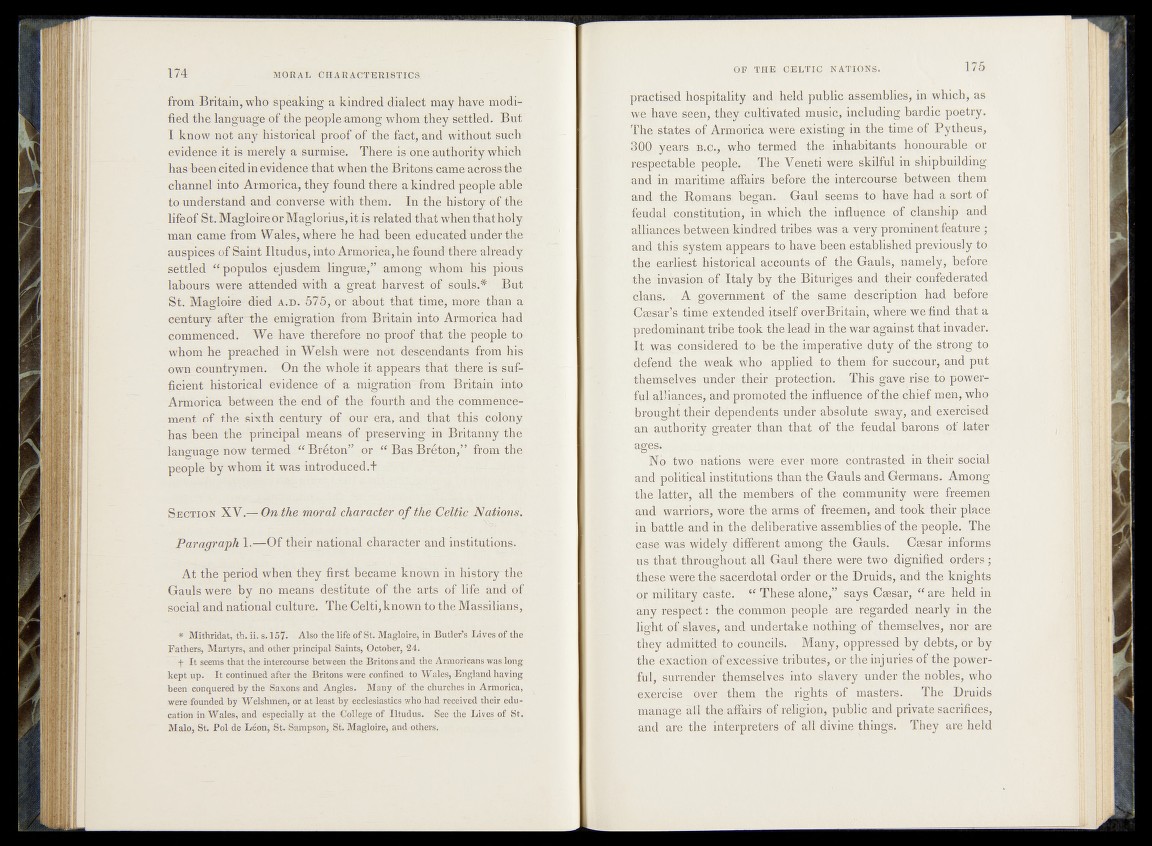
fromBritain,who speaking a kindred dialect may have modified
the language of the people-among whom they settled. But
I know not any historical proof of the fact, and without such
evidence it is merely a surmise. There is one authority which
has heen cited in évidence that when the Britons came across the
channel into Armorica, they found there a kindred people able
to understand and converse with them. In the history of the.
lifeof St. MagloireorMaglorius,it is related that when that holy
man came from Wales, where he had been educated under the
auspices of Saint Iltudus, into Armorica, he found there already
settled “ populos ejusdem linguae,” among whom his pious
labours were attended with a great harvest of1 souls.# But
St. Magloire died a .d . 575, or about that time, more than a
century after "the emigration from Britain into Armorica had
commenced. We have therefore no proof that the people tor
whom he preached in Welsh were not' despond ants from his
own countrymen. On the whole it appears that there Tâ;sufficient
historical evidence- of a migration7from Britain Into
Armorica between the end of the fourth and the commencement
of the sixth century of our era, and that this colony
has been the principal means «>f preserving in Britaim'y the
language now termed “ Bréton” or u Bas Bréton,” from the
people by whom it was introduced.f
S e c t io n XV.— On the moral character o f the Celtic, Nations.
Paragraph 1.—Of their national character and institutions.
At the period when they first became known in history^thA
Gauls were by no» means destitute of the arts of life and of
social and national culture. The Gelti, known to the Massilians,
* Mithfidat, th. ii. s. 157.' Also the life of St. Magloire, in Butler’s Lives of the
Fathers, Martyrs, and other'principal Saints, October, 24.
-j- I t seems that the-intercourse between the Britons arid the Armoricans was long
kept up. I t continued after the Britons-were confined to Wales,-England having
been conquered by the Saxons and Angles. Many of the churches in Armorica,
were founded by Welshmen, or at least by, ecclesiastics who had received their education
in.Wales, and especially at the College of Iltudus. See the Lives of St*
Malo, St. Pol de Leon, St- Sampson, St. Magloire, and others.
practised hospitality and held public assemblies, in which, as
we have, seen, theyrcultivated jnus.ic, including bardic poetry.
The states of Armorica were existing in the time of Pytheus,
3ÛQ j years. B.C.À who termed1 the inhabitants honourable or
respectable p.eppïe,. The, Yeneti were skilful in shipbuilding
and in maritime ..affairs,..before the intercourse between them
and the Homans- began, Gaul see;nis to hayphad a sort of
feudal, Gpnstitntion, in-which, thg^inflüçnce.jof clanship.-
alliances between kind red tribes, was a yery prominent feature ;
and this system appears ^ihayieb'een.esteblished previously to
the earliest historical accounts of thp4?Gau 1 s „ n a mely, b,ef°re
th e ■ invasion o f Italy fey^tbeJBituri ge's^ and^tlieh- confederated
clans-p,*. A government of .the same h ad t|^efc$§>
--Ôæsar’s t^mejextended i t self oye r B ri fai n, where j we find that a
predominant trd ^fo o k ;tb,‘e»leatl iu the wa^against that invad,^,
It , was_ ppnsidÀjpdi to ; be the,imperative dutyKp f the,^ff opg tp
defend .fhe, weak vhO-.'aPPbe-d fQjthem. for^suppQprj^and ;pof f
thpmsqlves 5,under-their |^è,teçtion. This;,gàyp,risej; to pp.wer-r
ful aJliaMm^and promoted, the»- in fiu eh ^p fth e men, whp
brought their5fdqprr>ideufs u p d ^ A b s o l u t e i a n d | exprei&pd
an authority^J^jbeh’fhan that of ;the feud^Lbarons of later
n m
N-eV-t^Oj nations .wenepaver. mor^Qpntrasted in-their social
and political institutions than the Gauls and Germans. Among
the latter, all the meïnbers of -the. community were freeippn
and-warriors* wore the arms of freemen, and topk'their place
imbattle and in the deliberative assemblies of the|joeèple. The
case w.às widely. different among the GadlsM! Gh^afrinforms
us that throughout all Gaul there were two dignified orders;
these'#ere the sacerdotal order or the Drûïds, e|id the Ifnighstg
of military caste. u These a l o n e , a i j e helliin
any respect: the common people â^e regarded,nearly in the
light of slaves* and undertake .npthingpf- them^l^e^«nor are
they admitted to coun6%, Many* o p p o s e d by debts,.Or by
the exaction, of excessive tribh-t^vor'-the inj uries.of fhe ppwer-
ful, surrender themseLv^I|intbj;sfhMy ‘pncler the npbles, who
exercise Over -them the rights,, of n i t e r s . The Druids
manage all the affairs .of rdjigip|iy public .apd private sacrifias,-
and are the interpreters of all divine things. ‘ They are held